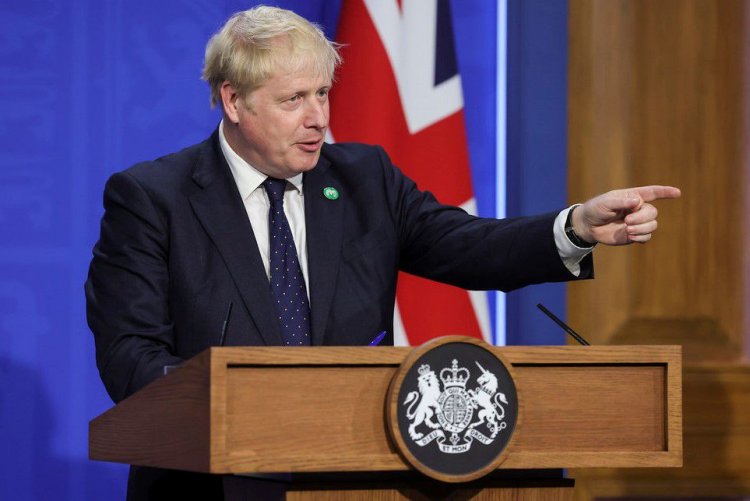How much national insurance hike will cost your business
By Timothy Adler on Small Business UK - Advice and Ideas for UK Small Businesses and SMEs The Government's £11bn national insurance tax grab to pay for social care will hurt economic recovery and create unemployment, warn small businesses and economists The post How much national insurance hike will cost your business appeared first on Small Business UK.

By Timothy Adler on Small Business UK - Advice and Ideas for UK Small Businesses and SMEs

UPDATED: Business secretary Kwasi Kwarteng is understood to have privately raised concerns about the impending rise in National Insurance contributions coming in April with the Chancellor.
Mr Kwarteng is thought to be worried that the National Insurance tax hike will reduce hiring because the cost of every staff member to businesses will be higher.
This is despite him publicly conceding that National Insurance will increase, despite saying last summer that not increasing NI was a manifesto pledge.
Under the change, employers and employees will each be taxed an additional 1.25 percentage points.
Economists have warned the £11bn national insurance contribution (NIC) hike will create unemployment and stifle future job creation.
It’s estimated that the new rates will cost employers around £6.5bn (staff members would pay an additional £4.3bn).
The Federation of Small Businesses has warned that more than 50,000 jobs in UK small businesses are at risk from the National Insurance hike, which will cost British SMEs alone about £5.7bn.
The Chancellor is understood to be holding firm in favour of the increase, which will be used to pay for social care, despite figures showing the Chancellor’s fiscal headroom has increased because the Government borrowed substantially less than forecast last month. Mr Sunak is well aware that if the tax rise is delayed, it will become progressively harder to introduce it as the next general election approaches.
Politically, there is a game being played here, as the National Insurance increase is very much an initiative from embattled Prime Minister Boris Johnson — who yesterday repeatedly refused, in a television interview, to confirm the NI rise would go ahead in April.
Philip Shaw, chief economist at Investec, told the Telegraph that a middle way would be to abandon the employees’ NI rise to spare workers’ pay, while firms still pay the extra contribution.
Mike Cherry, chairman of the FSB, said: “Business owners who have done all they can to retain and support their staff during the pandemic are now being punished for that loyalty with an £11bn increase in NICs, which essentially serve as a jobs tax.”
Andrew Goodacre, chief executive of the British Independent Retailers Association, said: “Of all the options available to the Government, it is disappointing that increases in national insurance have been chosen because of the impact on lower paid workers and small businesses … despite all the positive economic data, this recovery is still very fragile”.
Paul Dales, chief UK economist at Capital Economics said that there could be 130,000 fewer people employed in a year or two if the rise in National Insurance contributions reduces GDP and the increased spending on the NHS and social care does nothing to offset it.
The Centre for Economics and Business Research has estimated that if a quarter of small business do not hire one extra employee because of increased national insurance, it would cost 350,000 jobs.
How much the national insurance hike will cost your small business
The planned 1.25 per cent percentage point increase on both employer and employee NICs from next year will lift the tax on employment from 22.7 per cent to 24.6 per cent and will widen the gap with the self-employed, whose own NIC rate will increase from 9 per cent to 10.25 per cent.
About two-fifths of all NICs are paid by employers, with the rest borne by staff.
And self-employed company directors, many of whom missed out on Covid-19 financial support, also will be hit by a 1.25 per cent increase in tax on how they pay themselves on dividends.
Cherry added: “The Government often celebrates the existence of 6m small businesses in the UK — the majority of which are sole traders, a group which will be hit especially hard by the NIC’s rise.”
Commenting on the Government bringing in self-employed dividends within the scope of the National Insurance hike, Institute of Directors chief economist Kitty Ussher told The Times: “The tax on dividends will yet again target directors of small companies. Incorporated sole traders and other owner-managers were the only group that were not supported by the Government during the pandemic.”
The rate on employer contributions paid by small businesses will rise to 15.05 per cent, up from 13.8 per cent.
For example, one staff member on the living wage, outside of London, will currently cost you £2,359.80 in National Insurance. However, with the 1.25 percentage point rise, this figure increases to £2,654.68 a year.
That means you’ll pay an additional £241.87 a year for each member of staff. If you have numerous members of staff, that figure ramps up very quickly.
However, prime minister Boris Johnson said that 40 per cent of businesses would not pay the new levy because of the employment allowance, which waives the first £4,000 of employer NICs for businesses with less than £100,000 of total NICs liabilities.
For employees, the rates on “class one” contributions which employees pay on earnings in excess £9,568 a year will rise from 12 per cent to 13.25 per cent, while the “upper earnings rate” – which kicks in on earnings of more than £50,270 a year – will increase from 2 per cent to 3.25 per cent.
This means that an employee earning £20,000 will be forced to hand over £130 a year more, while those on salaries of £40,000 and £60,000 will pay an extra £380 and £630 respectively, according to tax firm Blick Rothenberg.
National insurance hike for self-employed
The self-employed pay slightly lower rates “class four” contributions. The rate they pay will rise to from 9 per cent to 10.25 per cent on annual earnings of more than £9,568 and up from 2 per cent to 3.25 per cent on anything more than £50,270.
Some lower-earning freelancers pay “class two” national insurance at a rate of £3.05 a week on annual earnings from £6,515 up to the class four £9,568 threshold. The national insurance hike will not apply to “class two” contributions.
Employees and employers can reduce the amount they amount of national insurance they pay via salary sacrifice schemes, where workers pay for workplace benefits such as season ticket loans or to pay for bicycles, or by upping how much they pay into workplace pension schemes.
Further reading
Expected national insurance hike to cost businesses £3.5bn
The post How much national insurance hike will cost your business appeared first on Small Business UK.






















